中考英语语法专项复习之一般过去时现在完成时过去完成时课件(共30张PPT)
文档属性
| 名称 | 中考英语语法专项复习之一般过去时现在完成时过去完成时课件(共30张PPT) |  | |
| 格式 | ppt | ||
| 文件大小 | 2.1MB | ||
| 资源类型 | 教案 | ||
| 版本资源 | 通用版 | ||
| 科目 | 英语 | ||
| 更新时间 | 2022-09-12 20:15:32 | ||
图片预览

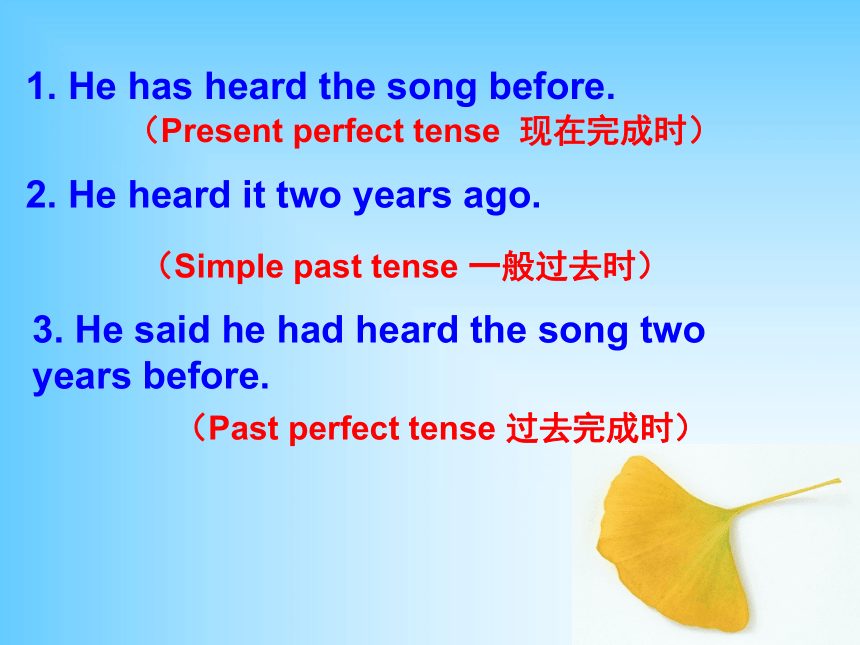

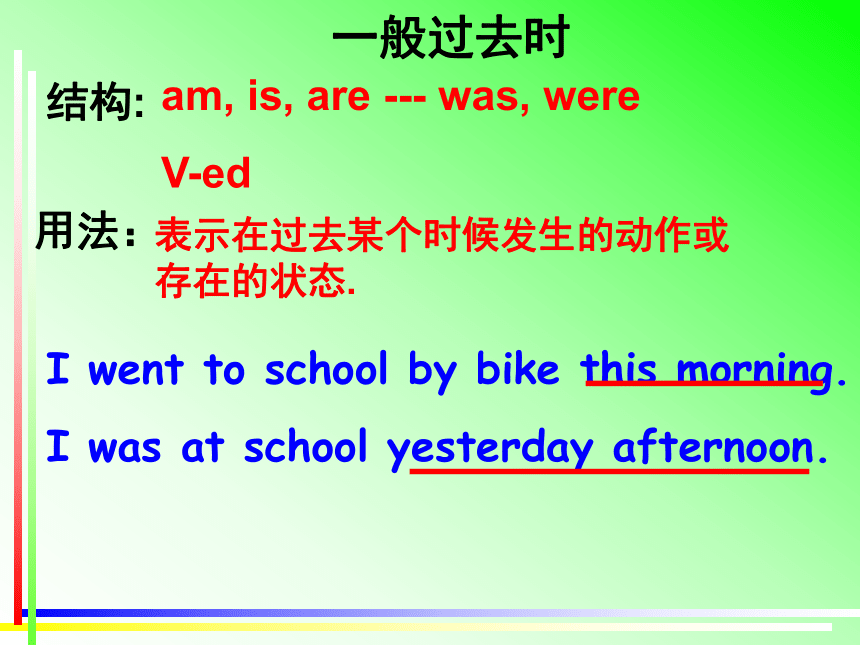
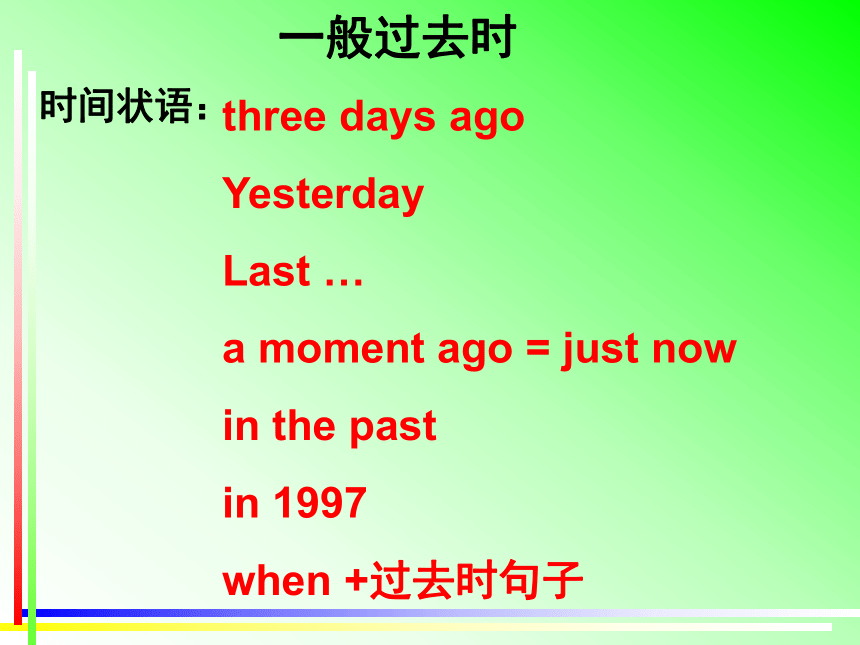
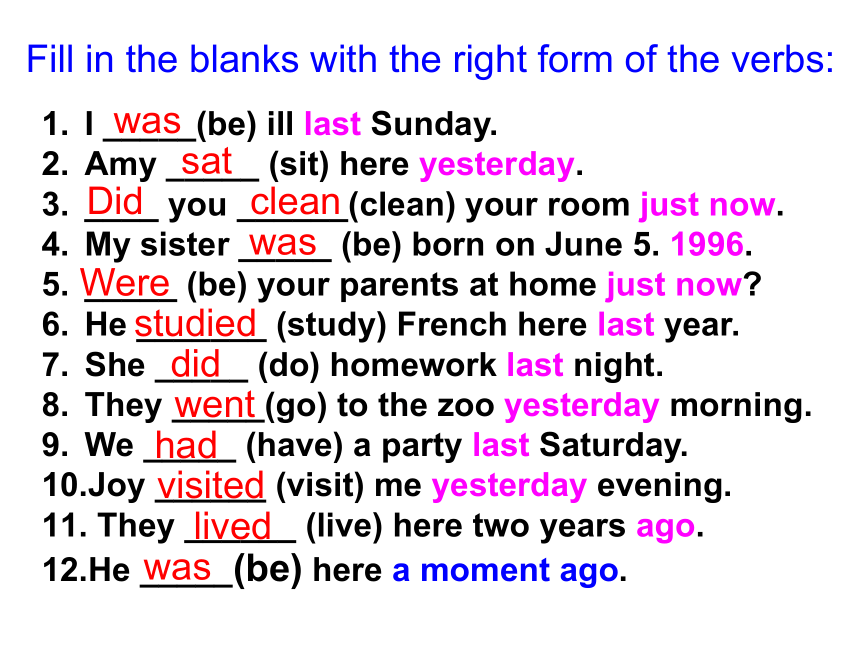

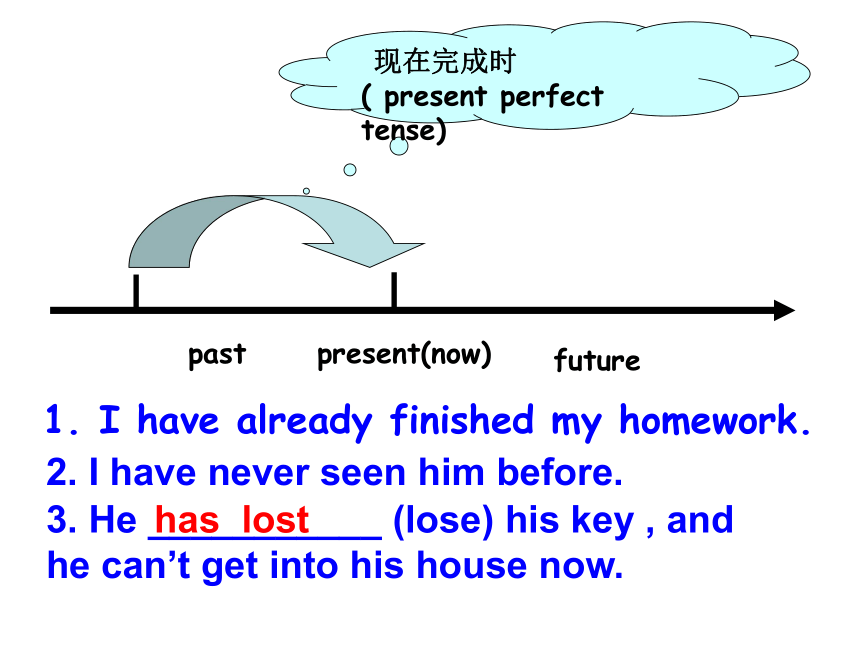
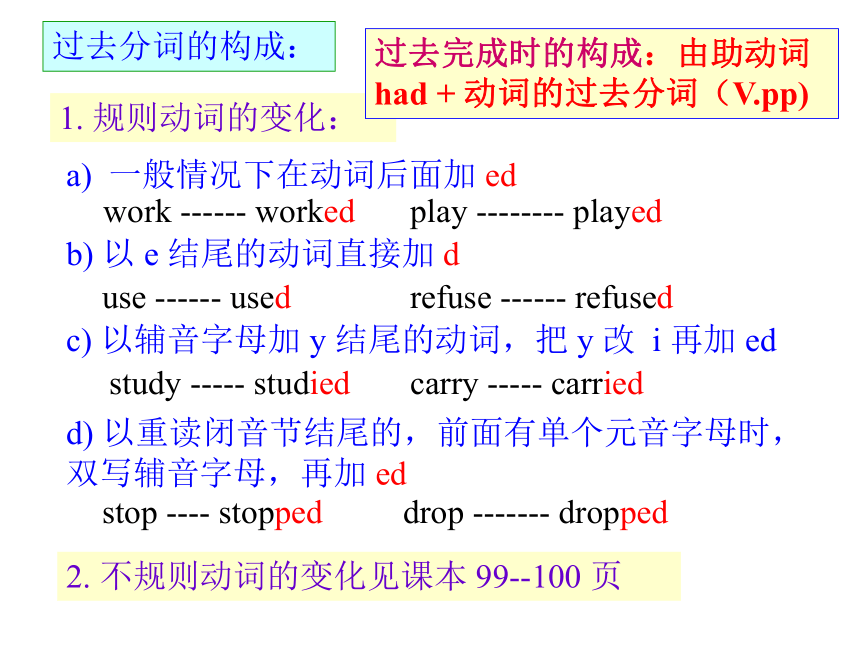
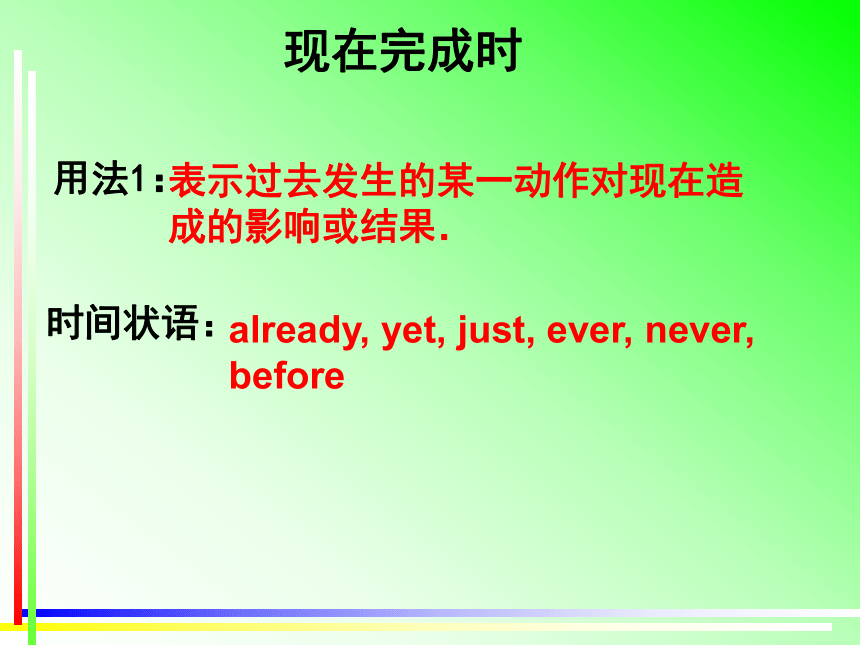
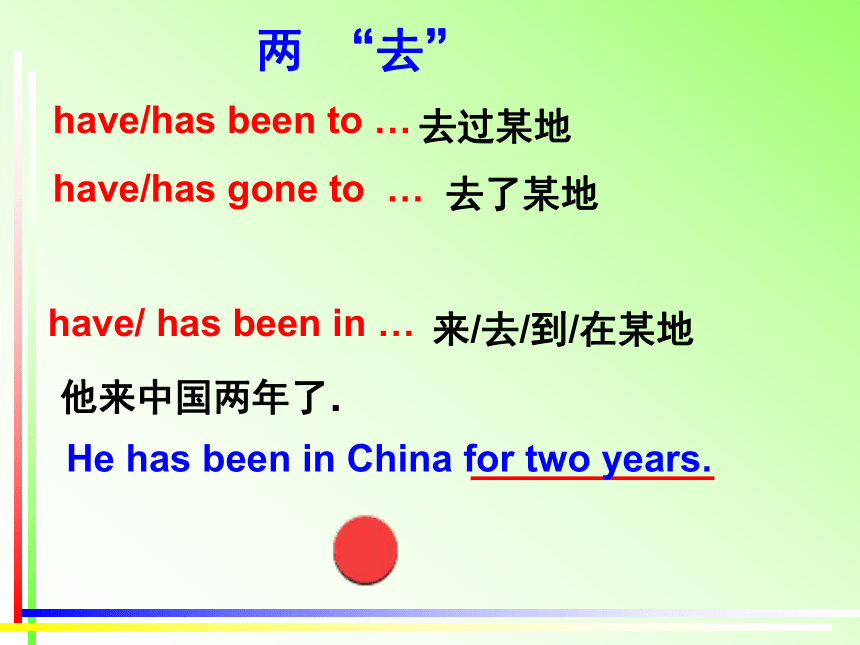
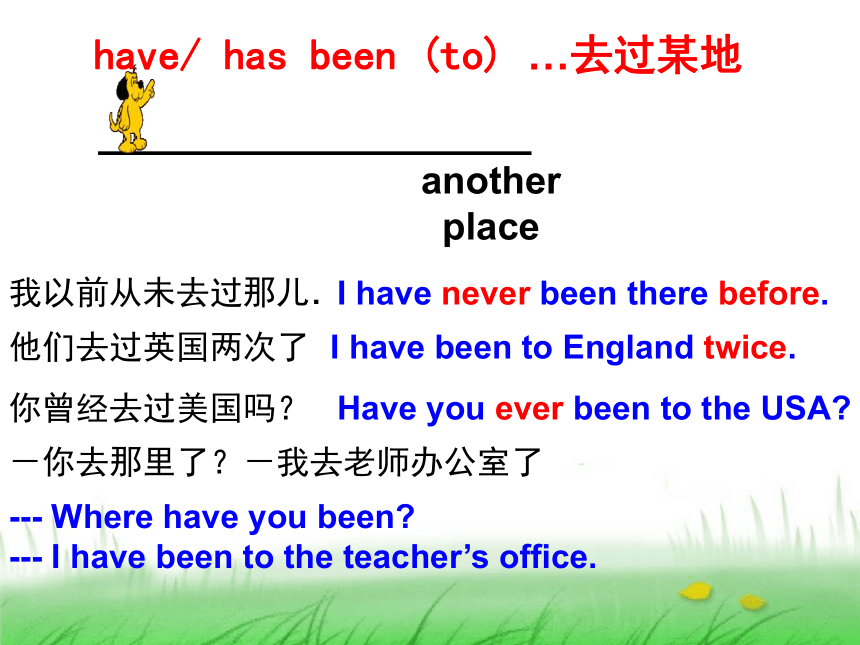
文档简介
(共30张PPT)
past perfect tense
过去完成时
(Simple past tense 一般过去时)
1. He has heard the song before.
(Present perfect tense 现在完成时)
3. He said he had heard the song two years before.
(Past perfect tense 过去完成时)
2. He heard it two years ago.
Simple past tense
一般过去时
表示在过去某个时候发生的动作或存在的状态.
I went to school by bike this morning.
I was at school yesterday afternoon.
一般过去时
结构:
am, is, are --- was, were
V-ed
用法:
three days ago
Yesterday
Last …
a moment ago = just now
in the past
in 1997
when +过去时句子
一般过去时
时间状语:
Fill in the blanks with the right form of the verbs:
I _____(be) ill last Sunday.
Amy _____ (sit) here yesterday.
____ you ______(clean) your room just now.
My sister _____ (be) born on June 5. 1996.
_____ (be) your parents at home just now
He _______ (study) French here last year.
She _____ (do) homework last night.
They _____(go) to the zoo yesterday morning.
We _____ (have) a party last Saturday.
Joy ______ (visit) me yesterday evening.
They ______ (live) here two years ago.
He _____(be) here a moment ago.
was
sat
Did clean
was
Were
studied
did
went
had
visited
lived
was
Present perfect tense
现在完成时
present(now)
future
past
现在完成时
( present perfect tense)
1. I have already finished my homework.
2. I have never seen him before.
3. He ___________ (lose) his key , and he can’t get into his house now.
has lost
过去分词的构成:
1. 规则动词的变化:
a) 一般情况下在动词后面加 ed
work ------ worked
play -------- played
b) 以 e 结尾的动词直接加 d
use ------ used
refuse ------ refused
c) 以辅音字母加 y 结尾的动词,把 y 改 i 再加 ed
study ----- studied
carry ----- carried
d) 以重读闭音节结尾的,前面有单个元音字母时,双写辅音字母,再加 ed
stop ---- stopped
drop ------- dropped
2. 不规则动词的变化见课本 99--100 页
过去完成时的构成:由助动词had + 动词的过去分词(V.pp)
现在完成时
用法1:
already, yet, just, ever, never, before
表示过去发生的某一动作对现在造成的影响或结果.
时间状语:
两 “去”
have/has been to …
have/has gone to …
去过某地
去了某地
have/ has been in …
来/去/到/在某地
他来中国两年了.
He has been in China for two years.
have/ has been (to) …去过某地
我以前从未去过那儿.
他们去过英国两次了
你曾经去过美国吗?
-你去那里了?-我去老师办公室了
I have never been there before.
I have been to England twice.
Have you ever been to the USA
--- Where have you been --- I have been to the teacher’s office.
another place
have/ has gone to …去了某地
Tom isn’t here. He _______________ Beijing.
2. --- Where is Mr. Li
--- He _____________ Beijing, and he will come back in two weeks.
has gone to
has gone to
another place
现在完成时
用法2:
表示过去已经开始,并持续到现在(包括现在在内)的动作或状态.
N
P
F
时间状语:
1. for+一段时间
2. since+过去时间点
yesterday
last …
three days ago
1997
this morning
then
since+过去时句子
3.how long
since I was born
We have learned English for six years.
He has worked in the factory since he left school.
They have lived in Beijing since 1980.
How long have you studied in this school
现在完成时
用法2:
1.我们学英语六年了.
2.自1980年起他们就住在北京了.
3.自他毕业起他就在这个工厂工作了.
4.你在这个学校学习多长时间了.
have
keep
be away (from)
be in
be on
be dead
be a member of/be in
be in
遇到表示一段时间的时间状语,瞬间动词必须改成延续性动词或短语。
buy _______ borrow _________
begin _______ leave ___________
die _______ come/ go to _________
join _______________________
arrive at/ reach/ get to _______
现在完成时
用法2:
Sam got sick two days ago .
Sam has been sick for two days.
Sherry got her driver’s license (执照) in 1999.
Sherry has had her driver’s license since(自从) 1999.
Arnold started to play tennis in Jan.
Arnold has played tennis since Jan.
Maggie moved to Hawaii in 1996.
Maggie has lived in Hawaii for about 8 years.
Please translate the sentences into English
李雷买这本字典3天了。
Lilei ____________________ for three days.
2. 他们搬到这儿他的爷爷就去世了.
His grandfather ________________since they moved here.
3. 他两年前就离开家乡了.
He _____________________________ since two years ago.
has had the dictionary
has been dead
has been away from his hometown
现在完成时
时间状语:
in the past / last few years
recently
in recent years / months / days
by now / so far / up to now
past perfect tense
过去完成时
构成:助动词had + 动词的过去分词(V.pp)
用法:
1. 过去完成时动词表示过去某一时间或某一动作之前完成的动作或状态。在强调过去某一动作发生在另一动作之前时。
在强调过去某一个动作发生在另一个动作前常常用过去完成时态。
1.他说他以前见过你。
He said that he ______________ (see) you before.
had seen
2. 到六点钟为止他们已经工作八小时了。
By six o’clock they ______________(work) for eight hours.
had worked
2. 过去完成时词可以表示过去某一时刻之前发生的动作或呈现的状态,这一动作一直持续 或将继续下去。
By six o’clock they ____________ (work)for eight hours.
When I came to GZ , he _____________(be) there for a long time.
用法:
1. 到了六点钟为止,他们已经工作了八小时了。
2. 我到广州时,他在那里很长时间了。
had worked
had been
3.到上个月中旬我们在北京住了有五年时间了。
By the middle of last month we ______________(live) in Beijing for five years.
had lived
1. 到昨晚上,他已写完那封信。
By yesterday evening he ___________ (write) that letter.
2. 他说他以前见过你。
He said that he ____________(see) you before.
3. 当我进来时,他已做完了作业。
When I came in he ________________(finish) his homework.
过去完成时与 by then(截止到那时); by 9 o’clock(直到九点钟) by the end of …(在…结束/末之前); by the time…(在…时之前); up till then (直到那时); up until last night(直到昨晚)等连用,表示过去的过去。
had written
had seen
had finished
时间状语:
by +过去时间 ,
by the time +过去时的句子,
when / before +过去时的句子
过去完成时
3. 过去完成时和 already, just, ever, yet 等连用表示过去的过去。
用法:
例如:1. 他告诉我说他们队已经赢了。
He told me that his team _________ already ___________ (win).
had
won
2. 她说她仍没去过长城。
She said that she _______________(not go to) the Great Wall yet.
hadn’t been to
用法:
过去完成时与when, before, as soon as, till/ until 等引导时间状语的从句连用,强调动作发生的时间前后。
例如:1. 她到家之前她的孩子已经睡着了。
When she got home her children ____________(sleep).
had slept
2. 在他们到达之前电影已经开始了。
Before they arrived here the film _________ already ___________ (start).
had
started
Last night, as soon as I _______________ (finish) my work I went to sleep.
3. 我完成作业了就去睡觉了。
had finished
一般过去时:was/were /动词过去式
时间状语: three days ago,yesterday,last …,a moment ago = just now,in the past,in 1997,when +过去时句子
表示在过去某个时候发生的动作或存在的状态。
现在完成时:have/has+动词过去分词
时间状语:already, yet, just, ever, never, before,so far,for+一段时间,since+过去时间点
表示过去发生的某一动作对现在造成的影响或结果。
表示过去已经开始,并持续到现在(包括现在在内)的动作或状态。
过去完成时:had+动词过去分词
时间状语:by +过去时间 , by the time +过去时的句子,when / before +过去时的句子
过去的过去已发生、已完成。
I ____________(be) ill for 3 days.
Amy _____ (sit) here yesterday.
_____ you ________(clean) your room yet
My sister _____ (be) born on June 5. 1996.
_____ (be) your parents at home just now
He _______________ (die) since 2 years ago.
She_____ already _______(finish) her homework.
They _____(go) to the zoo yesterday morning.
Before they arrived the movie theater the film ______ already _______ (start).
Joy ______ (visit) me yesterday evening.
When I reached the bus station, the bus _____
already _____(go).
12. He said that he _________(be) to Beijing twice.
have been
sat
Have cleaned
was
Were
has been dead
has finished
went
had started
visited
had
gone
had been
past perfect tense
过去完成时
(Simple past tense 一般过去时)
1. He has heard the song before.
(Present perfect tense 现在完成时)
3. He said he had heard the song two years before.
(Past perfect tense 过去完成时)
2. He heard it two years ago.
Simple past tense
一般过去时
表示在过去某个时候发生的动作或存在的状态.
I went to school by bike this morning.
I was at school yesterday afternoon.
一般过去时
结构:
am, is, are --- was, were
V-ed
用法:
three days ago
Yesterday
Last …
a moment ago = just now
in the past
in 1997
when +过去时句子
一般过去时
时间状语:
Fill in the blanks with the right form of the verbs:
I _____(be) ill last Sunday.
Amy _____ (sit) here yesterday.
____ you ______(clean) your room just now.
My sister _____ (be) born on June 5. 1996.
_____ (be) your parents at home just now
He _______ (study) French here last year.
She _____ (do) homework last night.
They _____(go) to the zoo yesterday morning.
We _____ (have) a party last Saturday.
Joy ______ (visit) me yesterday evening.
They ______ (live) here two years ago.
He _____(be) here a moment ago.
was
sat
Did clean
was
Were
studied
did
went
had
visited
lived
was
Present perfect tense
现在完成时
present(now)
future
past
现在完成时
( present perfect tense)
1. I have already finished my homework.
2. I have never seen him before.
3. He ___________ (lose) his key , and he can’t get into his house now.
has lost
过去分词的构成:
1. 规则动词的变化:
a) 一般情况下在动词后面加 ed
work ------ worked
play -------- played
b) 以 e 结尾的动词直接加 d
use ------ used
refuse ------ refused
c) 以辅音字母加 y 结尾的动词,把 y 改 i 再加 ed
study ----- studied
carry ----- carried
d) 以重读闭音节结尾的,前面有单个元音字母时,双写辅音字母,再加 ed
stop ---- stopped
drop ------- dropped
2. 不规则动词的变化见课本 99--100 页
过去完成时的构成:由助动词had + 动词的过去分词(V.pp)
现在完成时
用法1:
already, yet, just, ever, never, before
表示过去发生的某一动作对现在造成的影响或结果.
时间状语:
两 “去”
have/has been to …
have/has gone to …
去过某地
去了某地
have/ has been in …
来/去/到/在某地
他来中国两年了.
He has been in China for two years.
have/ has been (to) …去过某地
我以前从未去过那儿.
他们去过英国两次了
你曾经去过美国吗?
-你去那里了?-我去老师办公室了
I have never been there before.
I have been to England twice.
Have you ever been to the USA
--- Where have you been --- I have been to the teacher’s office.
another place
have/ has gone to …去了某地
Tom isn’t here. He _______________ Beijing.
2. --- Where is Mr. Li
--- He _____________ Beijing, and he will come back in two weeks.
has gone to
has gone to
another place
现在完成时
用法2:
表示过去已经开始,并持续到现在(包括现在在内)的动作或状态.
N
P
F
时间状语:
1. for+一段时间
2. since+过去时间点
yesterday
last …
three days ago
1997
this morning
then
since+过去时句子
3.how long
since I was born
We have learned English for six years.
He has worked in the factory since he left school.
They have lived in Beijing since 1980.
How long have you studied in this school
现在完成时
用法2:
1.我们学英语六年了.
2.自1980年起他们就住在北京了.
3.自他毕业起他就在这个工厂工作了.
4.你在这个学校学习多长时间了.
have
keep
be away (from)
be in
be on
be dead
be a member of/be in
be in
遇到表示一段时间的时间状语,瞬间动词必须改成延续性动词或短语。
buy _______ borrow _________
begin _______ leave ___________
die _______ come/ go to _________
join _______________________
arrive at/ reach/ get to _______
现在完成时
用法2:
Sam got sick two days ago .
Sam has been sick for two days.
Sherry got her driver’s license (执照) in 1999.
Sherry has had her driver’s license since(自从) 1999.
Arnold started to play tennis in Jan.
Arnold has played tennis since Jan.
Maggie moved to Hawaii in 1996.
Maggie has lived in Hawaii for about 8 years.
Please translate the sentences into English
李雷买这本字典3天了。
Lilei ____________________ for three days.
2. 他们搬到这儿他的爷爷就去世了.
His grandfather ________________since they moved here.
3. 他两年前就离开家乡了.
He _____________________________ since two years ago.
has had the dictionary
has been dead
has been away from his hometown
现在完成时
时间状语:
in the past / last few years
recently
in recent years / months / days
by now / so far / up to now
past perfect tense
过去完成时
构成:助动词had + 动词的过去分词(V.pp)
用法:
1. 过去完成时动词表示过去某一时间或某一动作之前完成的动作或状态。在强调过去某一动作发生在另一动作之前时。
在强调过去某一个动作发生在另一个动作前常常用过去完成时态。
1.他说他以前见过你。
He said that he ______________ (see) you before.
had seen
2. 到六点钟为止他们已经工作八小时了。
By six o’clock they ______________(work) for eight hours.
had worked
2. 过去完成时词可以表示过去某一时刻之前发生的动作或呈现的状态,这一动作一直持续 或将继续下去。
By six o’clock they ____________ (work)for eight hours.
When I came to GZ , he _____________(be) there for a long time.
用法:
1. 到了六点钟为止,他们已经工作了八小时了。
2. 我到广州时,他在那里很长时间了。
had worked
had been
3.到上个月中旬我们在北京住了有五年时间了。
By the middle of last month we ______________(live) in Beijing for five years.
had lived
1. 到昨晚上,他已写完那封信。
By yesterday evening he ___________ (write) that letter.
2. 他说他以前见过你。
He said that he ____________(see) you before.
3. 当我进来时,他已做完了作业。
When I came in he ________________(finish) his homework.
过去完成时与 by then(截止到那时); by 9 o’clock(直到九点钟) by the end of …(在…结束/末之前); by the time…(在…时之前); up till then (直到那时); up until last night(直到昨晚)等连用,表示过去的过去。
had written
had seen
had finished
时间状语:
by +过去时间 ,
by the time +过去时的句子,
when / before +过去时的句子
过去完成时
3. 过去完成时和 already, just, ever, yet 等连用表示过去的过去。
用法:
例如:1. 他告诉我说他们队已经赢了。
He told me that his team _________ already ___________ (win).
had
won
2. 她说她仍没去过长城。
She said that she _______________(not go to) the Great Wall yet.
hadn’t been to
用法:
过去完成时与when, before, as soon as, till/ until 等引导时间状语的从句连用,强调动作发生的时间前后。
例如:1. 她到家之前她的孩子已经睡着了。
When she got home her children ____________(sleep).
had slept
2. 在他们到达之前电影已经开始了。
Before they arrived here the film _________ already ___________ (start).
had
started
Last night, as soon as I _______________ (finish) my work I went to sleep.
3. 我完成作业了就去睡觉了。
had finished
一般过去时:was/were /动词过去式
时间状语: three days ago,yesterday,last …,a moment ago = just now,in the past,in 1997,when +过去时句子
表示在过去某个时候发生的动作或存在的状态。
现在完成时:have/has+动词过去分词
时间状语:already, yet, just, ever, never, before,so far,for+一段时间,since+过去时间点
表示过去发生的某一动作对现在造成的影响或结果。
表示过去已经开始,并持续到现在(包括现在在内)的动作或状态。
过去完成时:had+动词过去分词
时间状语:by +过去时间 , by the time +过去时的句子,when / before +过去时的句子
过去的过去已发生、已完成。
I ____________(be) ill for 3 days.
Amy _____ (sit) here yesterday.
_____ you ________(clean) your room yet
My sister _____ (be) born on June 5. 1996.
_____ (be) your parents at home just now
He _______________ (die) since 2 years ago.
She_____ already _______(finish) her homework.
They _____(go) to the zoo yesterday morning.
Before they arrived the movie theater the film ______ already _______ (start).
Joy ______ (visit) me yesterday evening.
When I reached the bus station, the bus _____
already _____(go).
12. He said that he _________(be) to Beijing twice.
have been
sat
Have cleaned
was
Were
has been dead
has finished
went
had started
visited
had
gone
had been
同课章节目录
- 词法
- 名词
- 动词和动词短语
- 动词语态
- 动词时态
- 助动词和情态动词
- 非谓语动词
- 冠词
- 代词
- 数词和量词
- 形容词副词及其比较等级
- 介词和介词短语
- 连词和感叹词
- 构词法
- 相似、相近词比较
- 句法
- 陈述句
- 一般疑问句和否定疑问句
- 特殊疑问句及选择疑问句
- 反意疑问句
- 存在句(There be句型)
- 宾语从句
- 定语从句
- 状语从句
- 主谓一致问题
- 简单句
- 并列句
- 复合句
- 主谓一致
- 主、表语从句
- 名词性从句
- 直接引语和间接引语
- 虚拟语气
- 感叹句
- 强调句
- 倒装句
- 祈使句
- 句子的成分
- 句子的分类
- 题型专区
- 单项选择部分
- 易错题
- 完形填空
- 阅读理解
- 词汇练习
- 听说训练
- 句型转换
- 补全对话
- 短文改错
- 翻译
- 书面表达
- 任务型阅读
- 语法填空
- 其他资料
